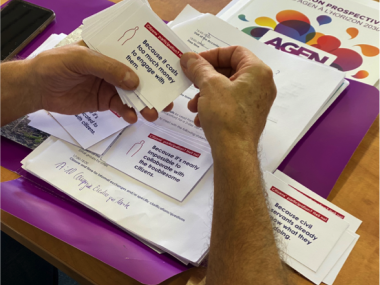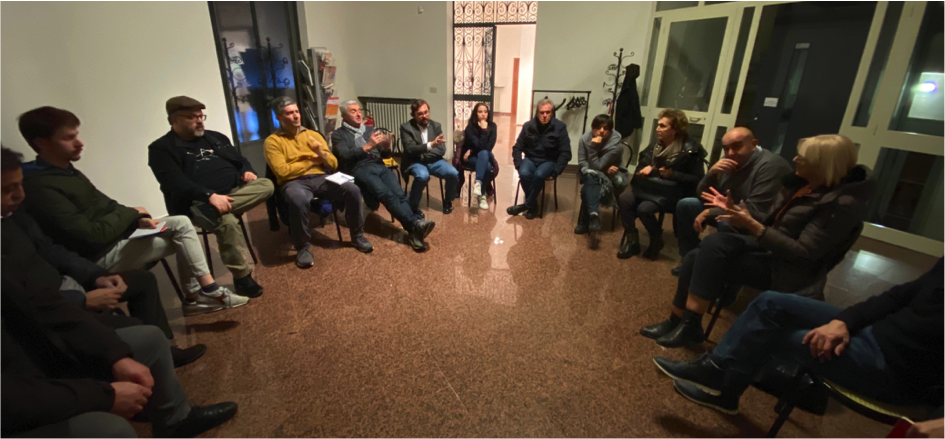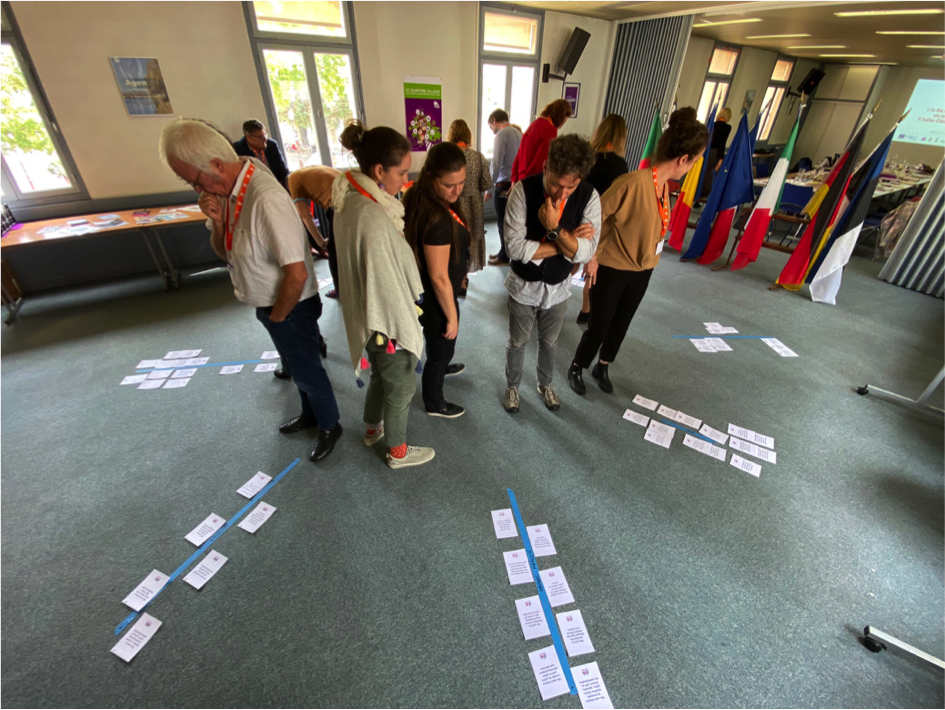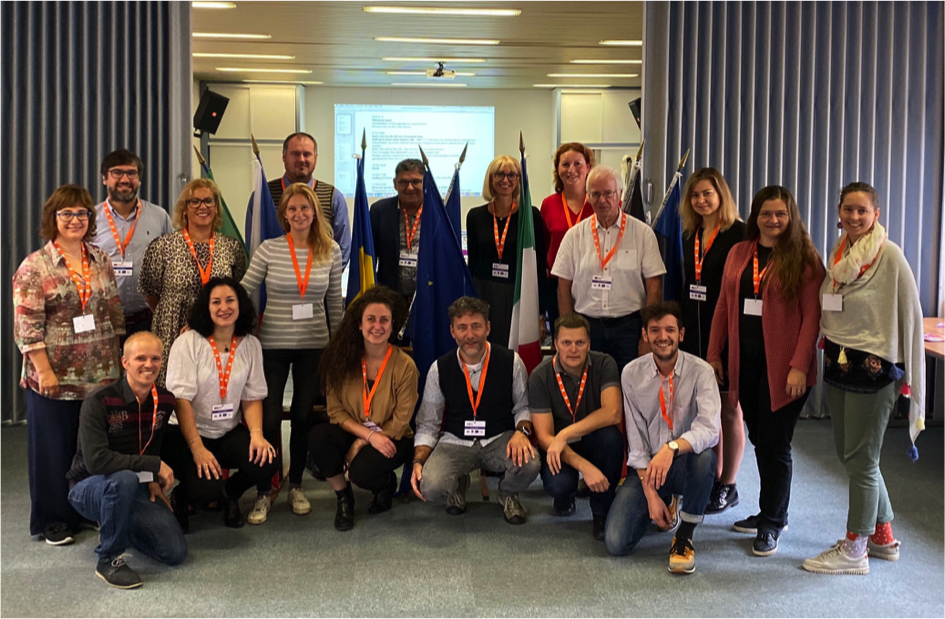Do we need participatory democracy to save democracy?
Edited on
22 April 2021Everyone acknowledges today that democracies around the world are increasingly challenged. The number of issues they have to face – and have difficulties to respond to (social justice, economic stability, climate change, etc.) – put our democracies at risk. On top of that, a growing number of people feel that they are not listened to or taken into consideration by policymakers. Citizens claim a right to have a say in public decisions, choices, and policies that are made.

At city level, local governments are not at rest either and face the same situation as national governments and appear quite unequipped to respond to the claim of citizens. Yet, they realise they have to better collaborate and involve citizens in decision-making processes and in the local governance of the city in general. Amongst those conscious cities, 8 small and medium-sized cities of Europe have decided to embark on the audacious journey of participatory democracy.
These 8 cities have gathered together in order to set up a network called Active Citizens. These cities all range in between 35 000 and 95 000 inhabitants. They are from all over Europe, -south, west, and east. From Portugal (Santa Maria da Feira) to France (Agen and Saint Quentin), Italy (Cento) to Germany (Dinslaken), Czech Republic (Hradec Králové), Romania (Bistrita), and Estonia (Tartu). These 8 cities have different experiences with participatory approaches, some having already engaged with participatory methods, while others are more at the beginning of the journey. However, they all have in common this shared feeling that they need to go further, and that they can do so, by joining together and learning from one another.

The ambition of the Active Citizens’ network of cities is quite clear: how to better involve citizens in the local governance of our cities? ‘But why would you do that?’ one could ask. Well, because, ‘we believe that by involving citizens into the local governance, we can build better policies, services, and cities as a whole. More efficient. More pertinent. More relevant. More adapted.’
‘But why would we need to involve citizens in the governance? We already have elected officials for that! It’s the whole principle of representative democracy!’
Yes. In principle. Elected officials are elected to represent citizens and ‘govern in their name’. And they do. But in many cases, they don’t represent ‘enough’ of the people. And even if they did, does this prevent them to compose with citizens during their whole mandate, for every decision? Cities acknowledge today that integrating a certain level of citizen participation (in some cases) to the decision-making process could be – not only – useful, but actually necessary.
Citizen participation? Hell no!
 Clearly, not everyone in city administrations (but also in national governments) is convinced of the added-value of citizen participation to governance. Reasons of NOT doing citizen participation are plenty. In order to identify them, we developed, within Active Citizens, a card game called ‘Citizen participation? Hell no!’. This game is composed of 42 reasons of NOT doing citizen participation. The cities of the network were asked to pick the ones they most often hear within their own administrations, by their colleagues (either civil servants or elected officials). Some of the reasons include: “citizen participation slows down every process or project’, ‘citizen participation is useless because citizens are not experts!”, “it’s too complicated to work with citizens”, “citizens are better at complaining, than at finding solutions”, “citizens have no interest in public actions & matters”, “no need for citizen participation, we already work with NGOs, unions and associations of consumers”, “with citizens, conversations always remain superficial and without depth”.
Clearly, not everyone in city administrations (but also in national governments) is convinced of the added-value of citizen participation to governance. Reasons of NOT doing citizen participation are plenty. In order to identify them, we developed, within Active Citizens, a card game called ‘Citizen participation? Hell no!’. This game is composed of 42 reasons of NOT doing citizen participation. The cities of the network were asked to pick the ones they most often hear within their own administrations, by their colleagues (either civil servants or elected officials). Some of the reasons include: “citizen participation slows down every process or project’, ‘citizen participation is useless because citizens are not experts!”, “it’s too complicated to work with citizens”, “citizens are better at complaining, than at finding solutions”, “citizens have no interest in public actions & matters”, “no need for citizen participation, we already work with NGOs, unions and associations of consumers”, “with citizens, conversations always remain superficial and without depth”.
Yes. There is still a long way to go in order to deconstruct these many ‘reasons’…
But... ‘what is it you want?’
There are many objectives which could motivate a city to engage in a network such as Active Citizens. The 8 cities of the network were therefore asked to express what were their motivations… and here is a little selection of the most common desires they have picked:
- We want to develop a culture of participation and a sense of active citizenship.
- We want to rebuild trust between citizens and the city administration.
- We want citizens to co-create solutions (ideas, plans, agendas, actions) with us, city administration.
- We want to facilitate the dialogue between elected officials and citizens.
- We want to collect citizensʼ opinions and views on public matters or actions.
- We want citizens to take an active part in urban planning projects and decisions.
This set of motivations highlight the richness and diversity of objectives (but also challenges) that the cities wish to tackle through citizen participation: from trust to dialogue, from consultation to co-creation, from concrete projects to public agenda, and more.
‘When you start doing citizen participation, you realize there are so many things you are not satisfied with, as a city administration’
For the cities who have already a bit of experience with forms of citizen participation, all of them are not 100% satisfied with how things are. ‘First, It’s always the same people who show up’. That’s the so-called ‘usual suspects’. And, most often, they are all retired. ‘This is not satisfactory, as a public administration’. Indeed, cities want citizens to be as diverse as possible, as representative as possible (of all the inhabitants and potential voices). ‘Citizens tend to only speak up for their personal interest, not necessarily the common good’, yet it is the role of a public authority to ensure that public policies and services shall be for the common good. ‘In the neighbourhood councils, we decided that the citizens would be elected by the inhabitants but we realise that, once elected, they don’t all necessarily consult the citizens afterward’. Even though the idea was to give power to citizens, we end up having just a new layer of not-functioning-so-well ‘representative democracy’, at the micro-level of a neighbourhood, instead of a city one. Of course, all the cities are experimenting, testing, piloting, exploring and learning from their experiments, what works well, what works not so well, what does not work, then revise, change, redesign their ways of doing. And citizens contribute to it (requesting particular trainings, suggesting changes, etc.). Both sides have to learn how to collaborate better, as it is not a natural thing for any of them.
There is hope, there is urgency, there is pressure
Participatory democracy is a trendy topic. No doubt. The number of articles, news, papers, books, case studies, of participatory democracy are multiplying like never before in the last decade. At the same time, toolkits, guidelines, toolboxes, and handbooks of all kind are also multiplying and meant to support cities in the adoption of participatory approaches in their governance. Yet, the trendy nature of the topic is not without risk. Indeed, as the topic becomes ‘a nice thing to do and have’, some cities tend to apply participatory approaches either in bad ways (tools, methods, formats) or for the bad reasons (fake motives, hidden agenda) leading to what could be called ‘fake public participation’. And this can have disastrous effects on democracy. Indeed, the number of active citizens willing to take part, to a certain degree, to public decision making processes, are not – let’s be honest – millions (yet). So doing ‘fake public participation’ can convince the most willing citizens that participation processes are just smoke and mirrors. Disappointing, once again. And lowering a bit more the citizens’ trust in politics, and, by extension, the democratic model. But there is hope, because citizens are present and willing to take part, and city administrations (like the ones of Active Citizens) are also more and more inclined to go towards a more participatory democracy and want to do it right, meaning with honesty, transparency, attention, care and empathy.
 Submitted by Christophe Gouache on
Submitted by Christophe Gouache on

